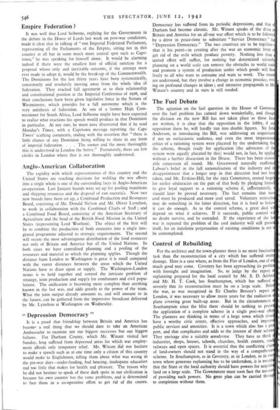Control of Rebuilding
For the architect and the town-planner there is no more fascinatin task than the reconstruction of a city which has suffered enem damage. Here is a case where, as from the Fire of London, out of e much good may come. Coventry has been approaching its proble with foresight and imagination. So, to judge by the report o replanning prepared for the local council by Mr. S. D. Adshe and Mr. H. T. Cook, has Southampton, which has suffered severely that its reconstruction must be on a large scale. Belo the war, as was recognised in Sir Charles Bressey's report London, it was necessary to allow many years for the realisation plans covering great built-up areas. But in the circumstances Southampton since the blitz there should be nothing to preve the application of a complete scheme in a single post-war eff The planners are thinking in terms of a large town which shoo have a worthy civic centre, effective approaches, and improv public services and amenities. It is a town which also has a gre port, and that complicates and adds to the interest of their schem They envisage also a suitable aerodrome. They have to think industries, shops, houses, schools, churches, health centres, road railways and open spaces. It is essential that the conflicting cla of land-owners should not stand in the way of a comprehen scheme. In Southampton, as in Coventry, as in London, as in eve town where generous replanning has to be undertaken, it is essen that the State or the local authority should have powers for acqu land on a large wale. The Government must soon face the necessi of providing such powers. No great plan can be carried thro to completion without them.


























 Previous page
Previous page